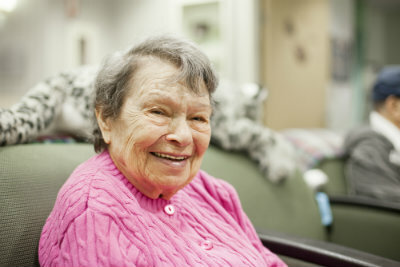Person-Centered Care


Person-Centered Care
We all want a better life for those living with memory loss. “Person-centered care” is an approach that guides caregivers and families in knowing and honoring the person first – before the disease. This approach aims to see the person with dementia as an individual, rather than focusing on their illness or on abilities they may have lost. It is based on the principle that all individuals, regardless of their disability, deserve to be treated with dignity and respect and can lead fulfilling and meaningful lives.

Person-centered care is the guiding principle of the Jewish Home’s Goldenberg•Ziman Special Care Center. This approach considers the whole person, taking into account each individual's unique qualities, abilities, interests, preferences and needs, instead of treating the person as a collection of symptoms and behaviors to be controlled.
All GZ staff members are involved in the residents’ care and are responsible for the “life happiness” of those in the Center. Families are an integral part of this process, helping the GZ staff learn life stories, personal likes and dislikes, working history, and special cues used to communicate. This information is incorporated into the care plan and helps the staff develop meaningful relationships with the individual.
At GZ, a variety of person-centered activities and techniques are evident in daily life. For example, reminiscence is facilitated with appropriate props and considers the importance of each individual’s reality. The GZ staff tries to ensure no task or aspect of care is placed higher than the experience of the individual. Routines and activities are designed so they are flexible for the person with dementia, or easily adapted according to individual’s wishes.
There are numerous benefits to a person-centered care approach. It has been shown that when people with dementia are involved in social activities and encouraged to become engaged in activities they find enjoyable, there is an improved quality of life, particularly in reducing challenging behaviors. Studies have also shown decreased agitation can be obtained in person-centered care programs if there is freedom of choice regarding daily activities scheduling. This can lead to decreased verbal agitation levels.
Person-centered care can also help in sustaining a good relationship between the caregiver and the person affected by dementia. This in turn can maintain the individual’s high level of psychological well-being and productive behaviors and reduce depression.
Research indicates when people with dementia are being provided with the opportunity of expressing themselves and their needs, they will maintain a positive sense of self. This can significantly reduce their feelings of grief, anxiety, anger and feeling like a burden to others. Respecting past interests and current capabilities can improve sleep during the night and daytime napping, as shown in person-centered care research programs.
Person-centered care can also be a benefit for the staff. It has been shown that this approach reduces caregivers' frustrations and saves money by reducing hospitalizations and the use of medications, but more importantly, it provides a better quality of life for persons with dementia and their loved ones.